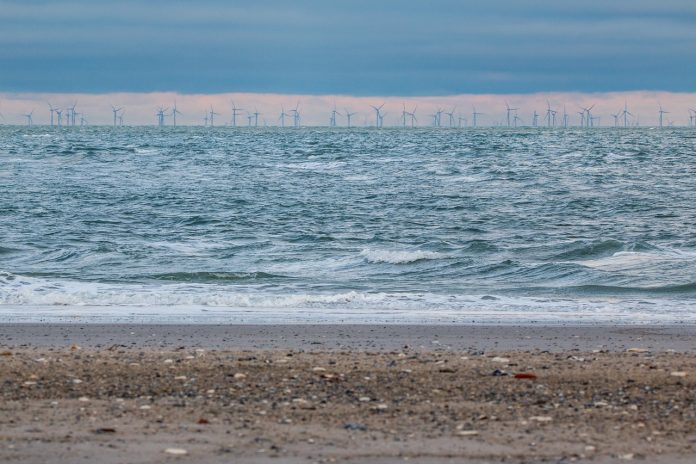By Robert Schmad
A large ship being built to construct offshore wind farms in a way that complies with a labor union-backed law is behind schedule and over budget, compounding a series of setbacks that have complicated the Biden administration’s efforts to expand domestic wind energy, according to The Wall Street Journal.
Charybdis, a massive boat under construction in south Texas, would be the first vessel legally allowed and able to carry wind turbine components from an American port and then install turbines in the open ocean, the WSJ reported. The ship is about a year behind schedule, which has placed a strain on the offshore wind industry and made it less likely that the United States meets the Biden administration’s goal of producing 30 GW of wind energy by 2030.
In addition to being behind schedule, Charybdis is projected to have a final cost of $625 million, around double what a similar ship would cost elsewhere, according to analysts.
The AFL-CIO, the largest labor union in America, supports the Jones Act, the law that makes Charybdis necessary. The Jones Act requires that American-made and staffed ships carry wind turbine parts to offshore farm sites, according to the WSJ.
No existing American ships have the capability to install the wind turbines many energy firms have planned, and foreign vessels that can build them are not allowed to pick up components directly from American ports.
Rather than large foreign ships directly picking up turbine parts from American ports, smaller American boats will shuttle parts from ports to the farm sites where foreign ships then use their cranes to pick up the parts and begin construction.
Turbine blades can be larger than football fields, and turbine towers can stand as much as 600 feet above water.
Ørsted, a Danish wind energy company, contracted Charybdis to construct two wind farms off the coast of New York but has since had to explore alternative options due to the delays, the WSJ reported.
There is an ongoing shortage of construction ships, contributing to wind energy projects being canceled and delayed, according to the WSJ.
Other wind power companies have paid tens of millions of dollars to get out of contracts to sell energy to utility companies after they were unable to complete projects, citing inflation and supply chain difficulties.
Cancellations of wind energy projects have complicated the Biden administration’s clean energy goals. The United States is only on track to meet about half of its 2030 offshore wind energy goal, according to Reuters.
Delays and cancellations will likely drive up the prices Americans end up paying for wind energy, according to the WSJ.
The Biden administration has financially supported the wind industry through tax credits and manufacturing subsidies.
Despite federal support, some experts think taxpayers could be on the hook to bail out failing wind companies.
“No one should doubt the willingness of the Biden administration and congressional Democrats to try to spend billions more debt-funded dollars to bail out their pet offshore wind industry,” David Blackmon, an energy consultant, previously told the Daily Caller News Foundation.
The AFL-CIO did not immediately respond to the DCNF’s requests for comment.
Robert Schmad is a contributor to The Daily Caller.
 Originally published by The Daily Caller. Republished with permission. Content created by The Daily Caller News Foundation is available without charge to any eligible news publisher that can provide a large audience. For licensing opportunities of our original content, please contact licensing@dailycallernewsfoundation.org.
Originally published by The Daily Caller. Republished with permission. Content created by The Daily Caller News Foundation is available without charge to any eligible news publisher that can provide a large audience. For licensing opportunities of our original content, please contact licensing@dailycallernewsfoundation.org.
To read more about offshore wind in the United States, click here.


























